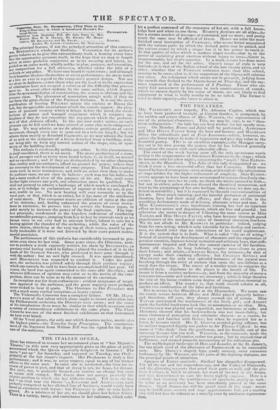THE ITALIAN OPERA.
GRIM has returned to resume her accustomed place at " her Majesty's Theatre," (a title now very appropriately given to the place of public amusement which the Queen especially delighteth to honour.) The opera " put up" for Saturday, and repeated on Tuesday, was Oldie; probably at the fair singer's request. Her Desdemona is truly a fine performance; and it was, in every respect, equal to any of her former efforts in the same part. In voice she is unaltered—the time for in- crease of power is past, and that of decay is yet, we hope, far distant. Ber style, too, is perfectly formed—to receive no change hut such as nature will compel. But Geist does nor occupy precisely the relative position in whieh she has hitherto stood. Till now, 'he has had " no rival near the throne "—,ASSANDRI and A seeisrszzr, each Perfectly competent to her allotted line of business, would vainly have dared an encounter with Geist : but Peitstaxt is able to take higher pound. As a mistress of her art, we should place her before Guise
i
There s a variety, fancy, and correctness in her cadences, which exhi- bit a perfect command of the resources of her art, with a full know- ledge how and when to use them. RIMINI'S font are are all alike—he has a certain number of passages at command, and no more: and pretty much the same may be affirmed of Gain. Hence we infer the more finished vocal instruction of PERSIANI ; who seems better acquainted with the various paths by which the desired point may be gained, and the various routes by which a singer has it in her power to reach it. In that quality of voice which a modern singer needs—that is, in the power of sustainieg great exertion without injury to tone—Gnisr is, unquestionably, her rival's superior. In a word, nature has done more for the one, and art for the other. Giusi's range of style is very limited—it is that of' the Italian school of the last twenty years, and no other: whether that of PERSIANI embraces more than this school, remains to be seen—that is, it the supporters of the Opera will tolerate any other. An indulgence which seems not in prospect, judging from the crowds that docked to the Opera.house on Thursday, and the rap- tures expressed at the performance of I Puritani. Those who can really find amusement in listening to such combiliations of sounds, which we cannot dignify by the name of music, are not likely to find enjoyment in what is really worthy to be so called. The former is level to their capacity—the latter is above it.


























 Previous page
Previous page